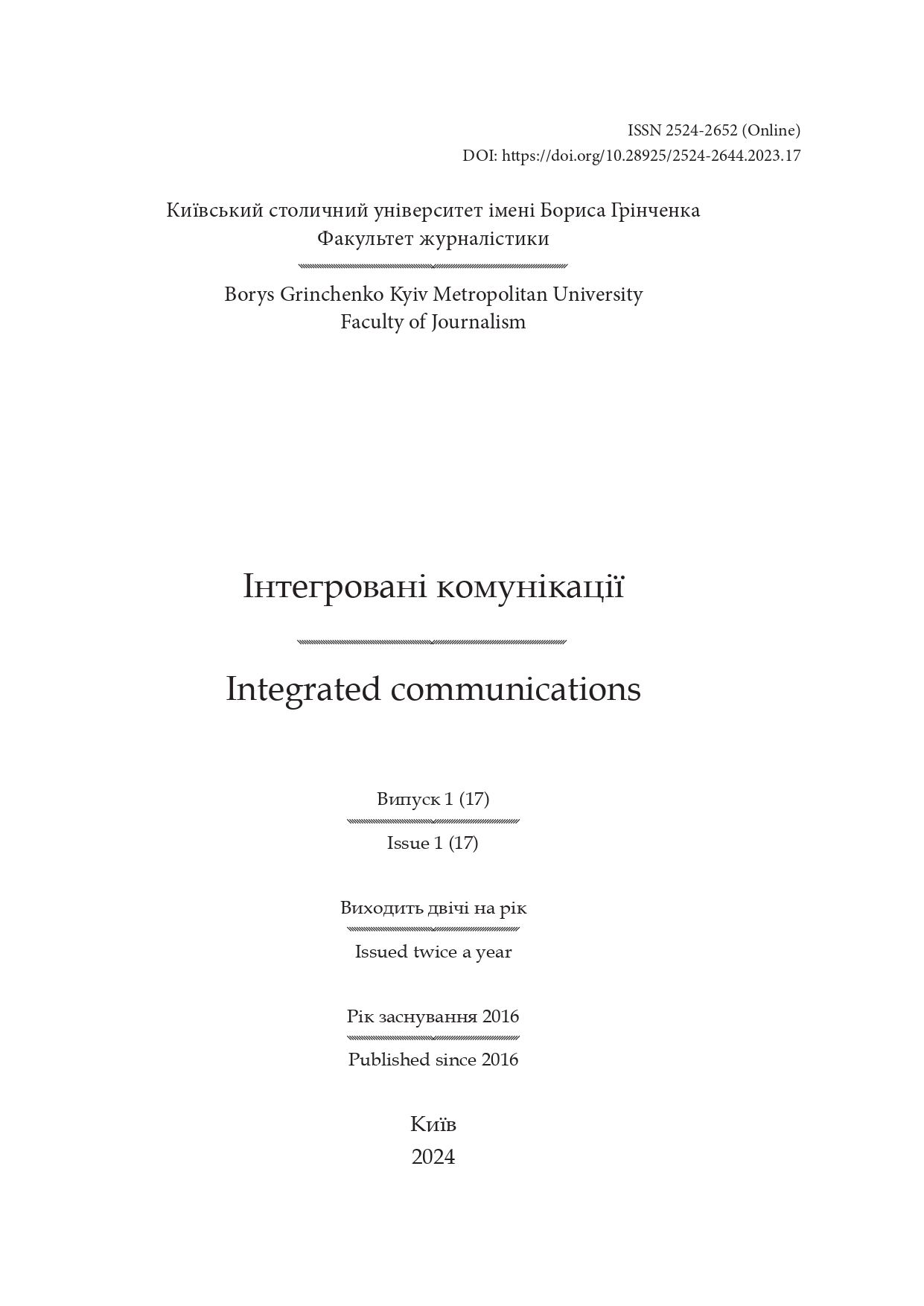GENOCIDAL STRATEGIES REGARDING UKRAINE IN RUSSIAN PROPAGANDA DISCOURSE
Abstract
Among researchers and scholars of legal sciences, the issue of recognizing several crimes committed by Russia against Ukraine and its population as genocide is currently under discussion. Instead, at the level of media discourse, a number of researchers have determined that Russian propaganda discourse contains genocidal features (for example, M. Ryabchuk, T. Snyder). In particular, scientists take into account such strategies as denial of genocide as a strategy for committing genocide (S. Cohen, A. Jones), dehumanization and demonization (H. Stanton, B. Bahador), manipulative use of the term «genocide» by Russian propaganda (V. Romaniuk, O. Dudko, E. Fortuin).
The purpose of the article is to determine the genocidal strategies regarding Ukraine in the Russian propaganda discourse based on their compliance with the ten stages of genocide developed by H. Stanton: 1. classification; 2. symbolization; 3. discrimination; 4. dehumanization; 5. organization; 6. polarization; 7. preparation; 8. persecution; 9. extermination; 10. denial. In the article, these stages are superimposed on the Russian propaganda media discourse and considered in the context of the Russian Federation’s war against Ukraine.
The compliance analysis was carried out based on the following criteria: intensity of hateful rhetoric, narrativization, and organization of the media system of the Russian Federation (level of state intervention in the agenda of information media resources). The case of the full-scale invasion of the Russian Federation into Ukraine on February 24, 2022, which was followed by mass killings of civilians, destruction of residential areas, and deprivation of living conditions of Ukrainians (such as shelling of energy infrastructure), was chosen for analysis.
The article analyzes how the physical actions of the Russian Federation against Ukraine are reflected in the propaganda media discourse and how they correspond to the stages of committing genocide, according to H. Stanton. In particular, the stages of classification, symbolization, dehumanization, polarization, and extermination in the Russian propaganda discourse can be considered as a manifestation of hateful rhetoric of varying intensity by increasing it with each stage concerning a certain group. The stages of discrimination, preparation, persecution, and denial are mostly revealed at the level of narratives about Ukraine, and the stage of organization is revealed in the media system of the Russian Federation.
Downloads
References
Bahador, B. (2023). Monitoring hate speech and the limits of current definition. Challenges and Perspectives of Hate Speech Research, рр. 291–298. https://doi.org/10.48541/dcr.v12.17
Cohen, S. (2013). States of denial: Knowing about atrocities and suffering. Polity Press.
Convention on the Prevention and Punishment of the Crime of Genocide (1948). Аvaible at: https://www.un.org/en/genocideprevention/documents/atrocity-crimes/Doc.1_Convention%20on%20the%20Prevention%20and%20Punish-ment%20of%20the%20Crime%20of%20Genocide.pdf (аccessed 30.03.2024).
Dudko, O. (2022). A conceptual limbo of genocide: Russian rhetoric, mass atrocities in Ukraine, and the current definition’s limits. Canadian Slavonic Papers, 1–13. https://doi.org/10.1080/00085006.2022.2106691
Fortuin, E. (2022). Ukraine commits genocide on Russians: The term “genocide” in Russian propaganda. Russian Linguistics. https://doi.org/10.1007/s11185-022-09258-5
Fredheim, R., Ahonen, A., Pamment, J. (2023). Denying Bucha: The Kremlin’s influence tactics in the aftermath of the 2022 Bucha atrocity. Lund university psychological defence research institute.
George, C. (2021). Hate propaganda. The routledge companion to media disinformation and populism. Routledge, 80–91. https://doi.org/10.4324/9781003004431-9
Herman, E. S., Chomsky, N. (2008). Manufacturing consent: The political economy of the mass media. Bodley Head.
Irvin-Erickson, D. (2017). Genocide discourses: American and Russian strategic narratives of conflict in Iraq and Ukraine. Politics and Governance, 5(3), 130–145. https://doi.org/10.17645/pag.v5i3.1015
Jones, A. (2006). Genocide: a comprehensive introduction. Routledge.
O kontrole za deiatelnostiu lyts, nakhodiashchykhsia pod ynostrannym vlyianyem, Federalnyi zakon (2022). Аvaible at: http://www.kremlin.ru/acts/bank/48170 (аccessed 30.03.2024).
O vnesenyy yzmenenyi v Uholovnyi kodeks Rossyiskoi Federatsyy y staty 31 y 151 Uholovno-protsessualnoho kodeksa Rossyiskoi Federatsyy, Federalnyi zakon (2022). Аvaible at: http://publication.pravo.gov.ru/Document/View/0001202203040007 (аccessed 30.03.2024).
Parent, G. (2016). Genocide denial: Perpetuating victimization and the cycle of violence in bosnia and herzegovina (bih). Genocide Studies and Prevention, 10(2), 38–58. https://doi.org/10.5038/1911-9933.10.2.1369
Riabchuk, M. (2023). Calling a spade a spade: How to unwrap a genocidal essence from the kremlin anti-ukrainian rhetoric. Eidos. A Journal for Philosophy of Culture, 6(4), 8–20. https://doi.org/10.14394/eidos.jpc.2022.0031
Romaniuk, V. (2023). Disinformation narratives of hate as a tool of escalating russia’s war against Ukraine (based on stopfake fact-checking project materials). Estonian Journal of Military Studies, 143–157.
Sergeitsev, T. (2022) Chto Rossyia dolzhna sdelat s Ukraynoi. RIA Novosti. Аvaible at: https://ria.ru/20220403/ukraina-1781469605.html?fbclid=IwAR0Uib3FDMZ-3ITzMS0xTLNu-00EdzMLzuqjmjRgOadzpZWC5Bzf8Boivqc (аccessed 30.03.2024).
Snyder, T. (2022). Russia’s genocide handbook. Аvaible at: https://snyder.substack.com/p/russias-genocide-handbook
Stanton, G. (2013). The ten stages of genocide. Genocide Watch.
Stattia Volodymyra Putina «Pro istorychnu yednist rosiian ta ukraintsiv». (2021). Prezydent Rossyy. Аvaible at: http://kremlin.ru/events/president/news/66182 (аccessed 30.03.2024).
Tchobo, D. L. R. (2022). Potential international crimes in Ukraine: should atrocities in Bucha be classified as genocide, war crimes, or crimes against humanity. Law and safety. https://doi.org/10.32631/pb.2022.2.01
Townsend, E. (2014). Hate speech or genocidal discourse? An examination of anti-roma sentiment in contemporary europe. PORTAL Journal of Multidisciplinary International Studies, 11(1). https://doi.org/10.5130/portal.v11i1.3287




